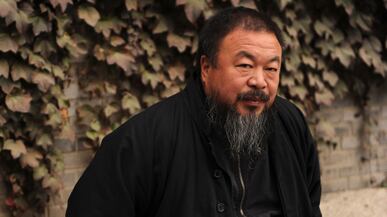On Sunday, China arrested its most famous artist/activist as he attempted to board a plane to Hong Kong—and he hasn’t been heard from since. But this isn’t the first time Ai has been taken prisoner by his government. Months after being beaten and detained in the summer of 2009, he reflected on his experience in Newsweek—and implored President Obama to discuss human rights during his first visit to the communist nation. Plus, Melinda Liu on the fear that led to Weiwei's arrest.
Sparking outrage and concern throughout the Western world, nearly four days after China’s government arrested Ai, his whereabouts are still unknown. For days, officials refused to even confirm that they had detained the artist—but in an editorial in the state-run newspaper Global Times on Wednesday, the government finally, if indirectly, admitted his imprisonment, calling him a “maverick.” Known for designing Beijing’s iconic Bird’s Nest Stadium for the 2008 Summer Olympics and creating last year’s Sunflower Seeds exhibit at the Tate Modern, Ai is an outspoken critic of the government, but many believed his international profile would protect him.
Read a personal essay Ai wrote for Newsweek in November 2009, about his violent run-in with authorities that summer.

In the early morning hours of Aug. 12, I was asleep in a hotel room in Sichuan when violent banging on my door abruptly awakened me. Roughly 30 policemen barged into my room and began pushing me. When I argued with them and asked for their ID, they beat me. They pinned my arms and someone punched me in the head. A month later, I nearly died from a brain hemorrhage.
I had traveled to Sichuan province to be a witness in the trial of Tan Zuoren, who is accused of trying to overthrow China's government by inciting subversion. Tan had been trying to ascertain the names of the more than 5,000 schoolchildren who died in the 2008 Sichuan earthquake. I wanted to be a witness in his trial because I too had been trying to look into this tragedy. In March, I asked on my blog for volunteers to join a citizens' investigation, because the government has refused to give us any information about the children. From the beginning I said, "Life has its own dignity. You cannot give us just numbers. What are their names? Who are their parents?" The volunteers made 200 phone calls to Sichuan government departments. The officials there told us that this information was a national secret. Nonetheless, we were able to publish the names of more than 5,000 of the children on my blog before the censors shut it down.
In China, there is a long history of the government not revealing information, so it's difficult for the Chinese people to ever know the truth. It is vital that we try to bring that truth to life. But like most oppressive societies, China doesn't have an independent judicial system. When a witness is stopped from appearing in court by the police, it means our legal system is like the Mafia. And there is no independent press to ask questions.
This week President Obama will make his first visit to China to focus on the global economy and climate change. I'm very supportive of Obama because I believe he represents great hope for America and the world—but it's inconceivable to me that he would visit China and not put human rights on the agenda. What does it matter if China's economy grows when there are no basic protections for its citizens? Obama must be clear about the West's values of freedom and human dignity.
It's difficult for the Chinese people to ever know the truth. It is vital that we try to bring that truth to life.
I never made it to Tan Zuoren's trial—after the police beat me, they kept me in my hotel room until the trial was over. (Tan still awaits his verdict.) A month later, I was in Munich for a solo art exhibition of my work. (I called it So Sorry, which are words favored by leaders who avoid responsibility for disasters. I created a frieze of schoolchildren's backpacks covering the front of the exhibition center.) The headaches I had been experiencing since my beating had gotten worse and I couldn't concentrate. When I checked into a hospital, I was told there was bleeding in my brain and I was near a fatal collapse. I was rushed into surgery. When I awoke, I felt almost like a normal person again. But I will not feel whole until I and my fellow Chinese can live freely.





